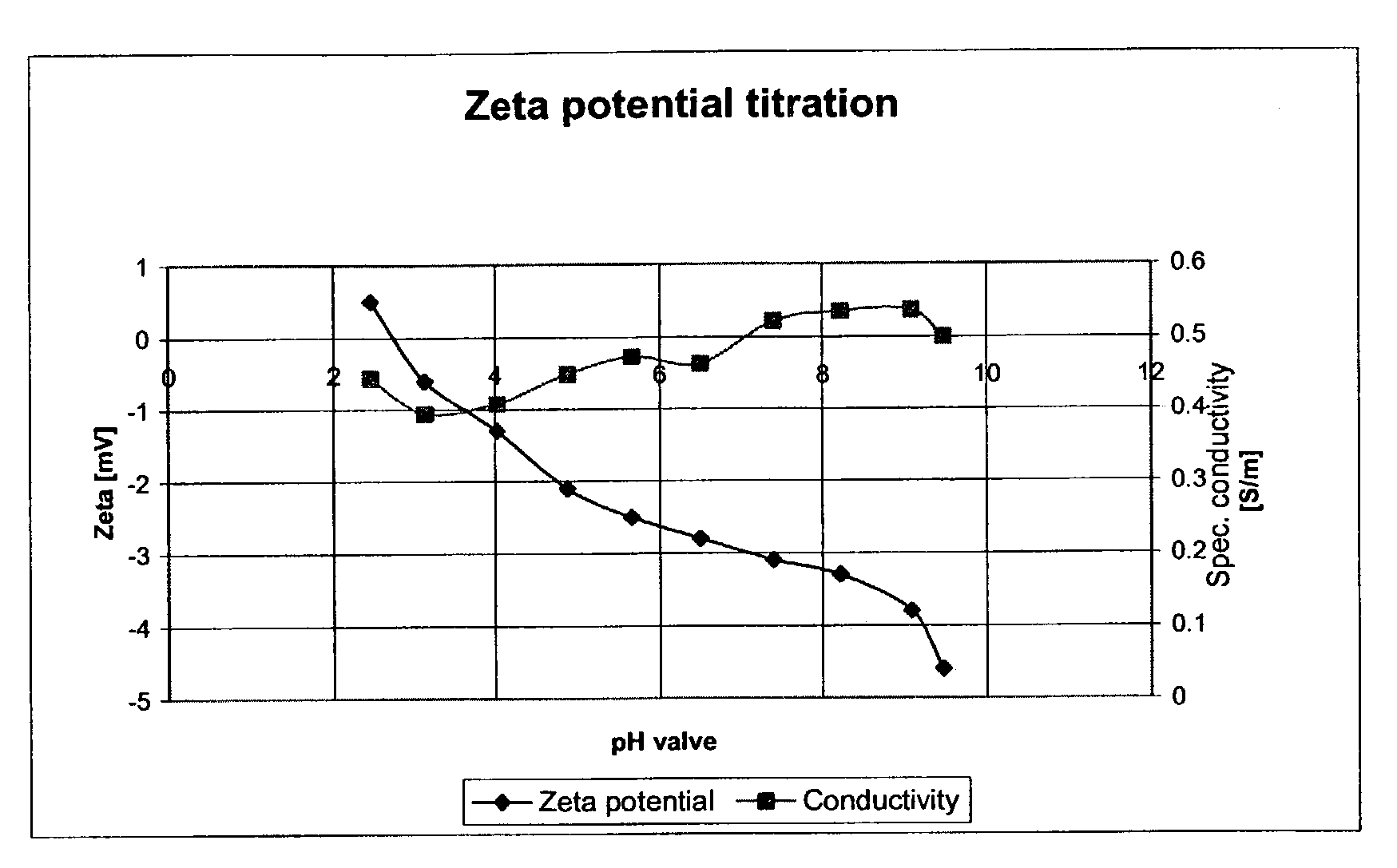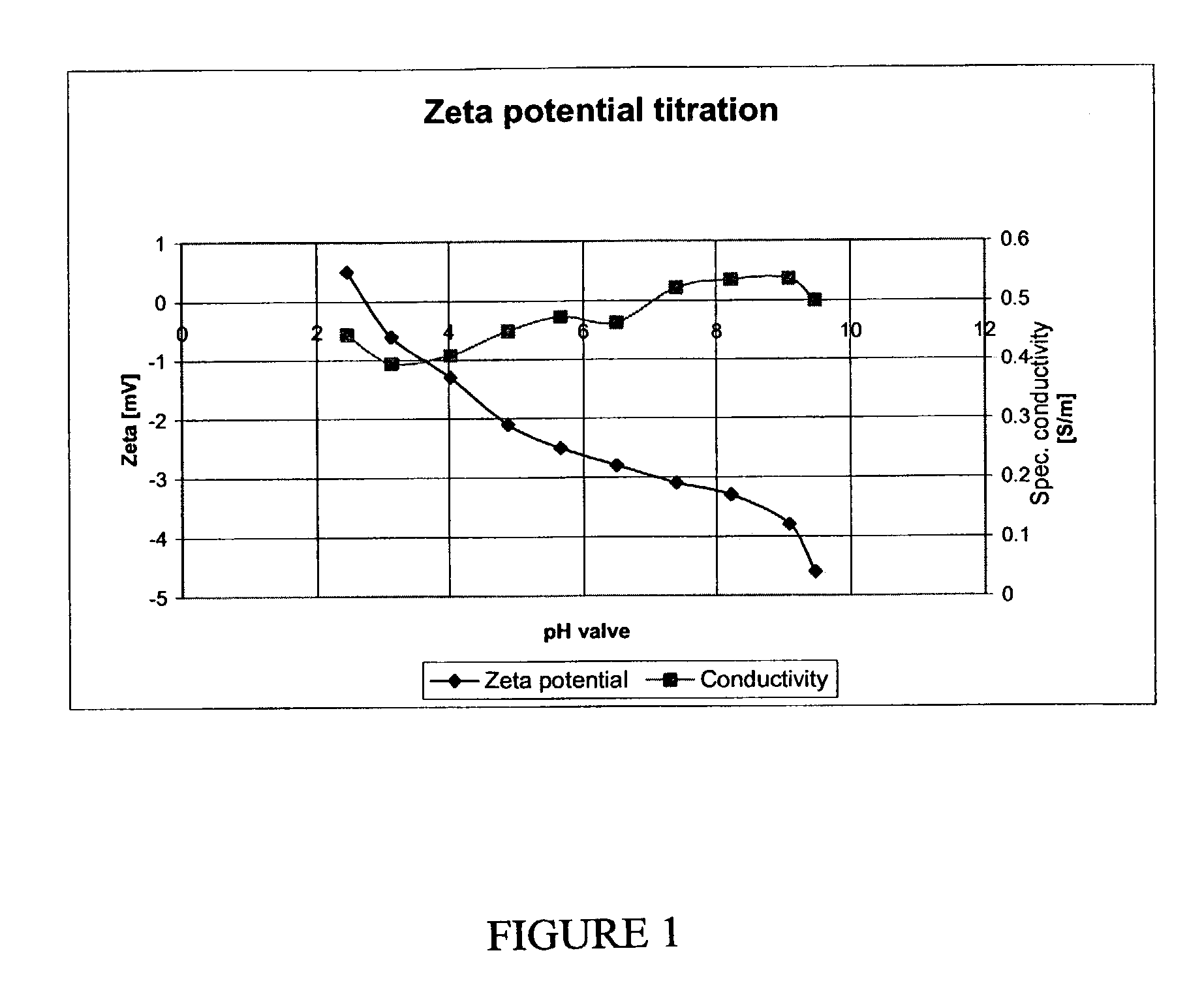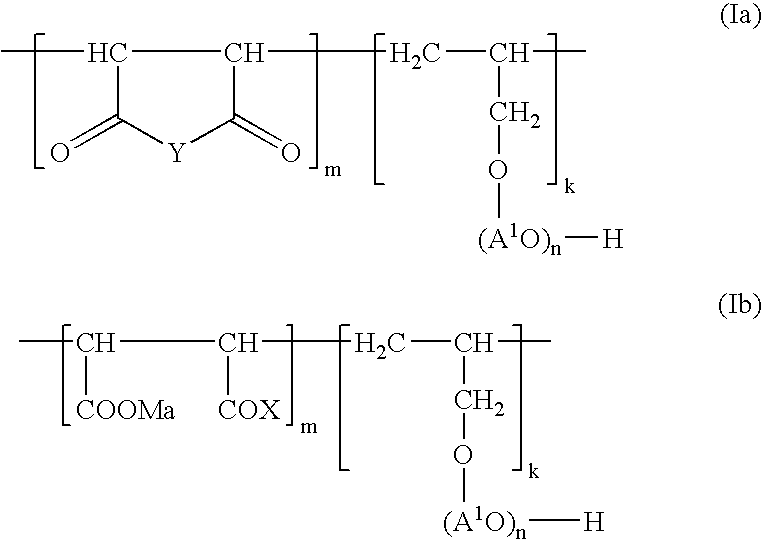High-concentration aqueous dispersions comprising hydrophilic microfine metal oxide particles and dispersion auxiliaries
a technology of hydrophilic microfine metal oxide particles and high-concentration aqueous dispersions, which is applied in the field of high-concentration aqueous dispersions comprising hydrophilic microfine metal oxide particles and dispersion auxiliaries, can solve the problems of unfavorable cosmetics, agglomeration, and skin premature aging
Inactive Publication Date: 2008-07-15
DEGUSSA AG +1
View PDF4 Cites 36 Cited by
- Summary
- Abstract
- Description
- Claims
- Application Information
AI Technical Summary
Benefits of technology
The resulting dispersions exhibit long-term storage stability, low viscosity, and enhanced electrostatic stabilization, ensuring the particles remain dispersed and effective as UV protectants in cosmetic formulations, maintaining stability for over six months at room temperature and one month at 50°C.
Problems solved by technology
The higher-energy UVB radiation causes typical sunburn symptoms and is also responsible for suppressing the immune defence, while UVA radiation, which penetrates more deeply into the layers of skin, causes premature aging of the skin.
Agglomerates are present in every pigment powder, but are undesired in cosmetic transparent formulations since they can be identified as particles on the skin, often times with the naked eye.
Moreover, agglomerates in cosmetic formulations reduce the transparency of the formulation as well as the UV protective action of a sunscreen composition and settle out during storage.
A result of the foregoing is that the stability of the emulsion can be endangered.
In practice, it has been found that as the finely divided nature of the particles increases, so too do the dispersion problems, with the result that the dispersion process overall represents one of the most complex sub-steps in the preparation of cosmetic formulations.
Although these dispersions have tendential improvements, the prior art dispersions still have the disadvantage that the aqueous dispersions comprise insufficiently high contents of microfine TiO2, sediment during storage and / or the photoactivity is still too high.
A further significant disadvantage is that the prior art dispersions are not stable in the pH range from about 5 to 7 (i.e., the pH of the surface of skin) which is particularly preferred for cosmetic formulations.
Method used
the structure of the environmentally friendly knitted fabric provided by the present invention; figure 2 Flow chart of the yarn wrapping machine for environmentally friendly knitted fabrics and storage devices; image 3 Is the parameter map of the yarn covering machine
View moreImage
Smart Image Click on the blue labels to locate them in the text.
Smart ImageViewing Examples
Examples
Experimental program
Comparison scheme
Effect test
examples 1 to 4
[0077]
Example1234TiO2 (Degussa P 25)35.0%35.0%40.0%40.0%Compound of the formula I10.5%10.5%12.0%12.0%(MW 15000)Glycerol—10.0%— 5.0%Propylene glycol——10.0%—Water54.5%44.5%38.0%43.0%Viscosity (mPas)10513150009000
the structure of the environmentally friendly knitted fabric provided by the present invention; figure 2 Flow chart of the yarn wrapping machine for environmentally friendly knitted fabrics and storage devices; image 3 Is the parameter map of the yarn covering machine
Login to View More PUM
| Property | Measurement | Unit |
|---|---|---|
| particle size | aaaaa | aaaaa |
| particle size | aaaaa | aaaaa |
| wavelength range | aaaaa | aaaaa |
Login to View More
Abstract
Aqueous dispersions comprising microfine metal oxide particles and dispersion auxiliaries, wherein, as dispersion auxiliaries, at least one of the compounds of the general formula (I)in whichM is hydrogen, monovalent or divalent metal cation, ammonium ion, organic amine radical;a is 1, or where M is a divalent metal cation, is ½;X is likewise —OMa or —O—(CpH2pO)q—Rl where R1═H, aliphatic hydrocarbon radical having 1-20 carbon atoms, cycloaliphatic hydrocarbon radical having 5 to 8 carbon atoms, optionally substituted aryl radical having 6 to 14 carbon atoms, p=2 to 4, q=0 to 100, —NHR2 and / or —NR22 where R2═R1 or —CO—NH2;Y is O, NR2;A1 is ethylene radical, propylene radical, isopropylene radical, butylene radical;m is 10 to 30;n is 0 to 50; andk is 10 to 30, where the summ+k is in the range from 20 to 60, is co-used.
Description
DESCRIPTION[0001]1. Field of the Invention[0002]The present invention relates to aqueous dispersions comprising hydrophilic microfine metal oxide particles and, as dispersion auxiliaries, maleic anhydride / maleate-acrylate copolymers. The present invention also relates to the use of these dispersions for the preparation of cosmetic formulations, in particular sunscreen formulations.[0003]2. Background of the Invention[0004]To protect skin against over-intensive UV radiation, cosmetic preparations, such as creams or lotions, containing UV filters are used which are largely transparent and pleasant to use on the skin.[0005]UV filters comprise one or more organic compounds which absorb in the wavelength range between 290 and 400 nm: UVB radiation (290 to 320 nm); UVA radiation (320 to 400 nm).[0006]The higher-energy UVB radiation causes typical sunburn symptoms and is also responsible for suppressing the immune defence, while UVA radiation, which penetrates more deeply into the layers o...
Claims
the structure of the environmentally friendly knitted fabric provided by the present invention; figure 2 Flow chart of the yarn wrapping machine for environmentally friendly knitted fabrics and storage devices; image 3 Is the parameter map of the yarn covering machine
Login to View More Application Information
Patent Timeline
 Login to View More
Login to View More Patent Type & Authority Patents(United States)
IPC IPC(8): A61K9/14A01N59/16A61K33/22A61K9/16A61K8/19A61K8/00A61K8/04A61K8/25A61K8/26A61K8/27A61K8/29A61K8/30A61K8/34A61K8/72A61K8/81A61Q17/04C09K23/00C09K23/14C09K23/52
CPCA61K8/04A61K8/044A61K8/27A61K8/29B01F17/0085A61Q17/04B01F17/0028B01F17/005A61K8/8164C09K23/16C09K23/017
Inventor BATZ-SOHN, CHRISTOPHBRANDT, PETRADIETZ, THOMASHASENZAHL, STEFFENJENNI, KLAUSLEHMANN, KATHRINMATHIAK, RALFRUTTGERODT, ANGELA
Owner DEGUSSA AG
Features
- R&D
- Intellectual Property
- Life Sciences
- Materials
- Tech Scout
Why Patsnap Eureka
- Unparalleled Data Quality
- Higher Quality Content
- 60% Fewer Hallucinations
Social media
Patsnap Eureka Blog
Learn More Browse by: Latest US Patents, China's latest patents, Technical Efficacy Thesaurus, Application Domain, Technology Topic, Popular Technical Reports.
© 2025 PatSnap. All rights reserved.Legal|Privacy policy|Modern Slavery Act Transparency Statement|Sitemap|About US| Contact US: help@patsnap.com



